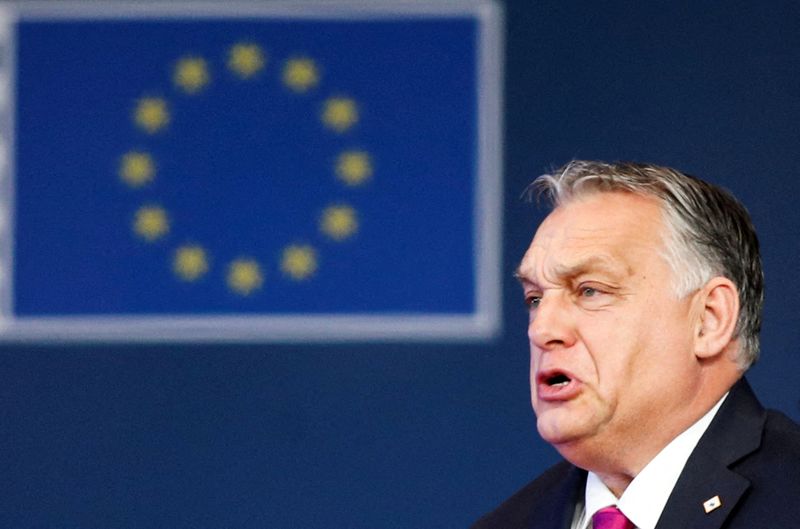By Gergely Szakacs
BUDAPEST (Reuters) - Hungary will freeze retail mortgage interest rates for a six-month period from January, the prime minister said on Wednesday, the latest measure to shield households from rising inflation ahead of a national election likely to be tightly contested.
Hungary's central bank, the first in the European Union to start raising borrowing costs since the start of the coronavirus pandemic in early 2020, has hiked its base rate by 180 basis points since June to its highest since May 2014.
Hungarian inflation surged to a 14-year-high of 7.4% in November, above expectations, driven by higher fuel, alcohol and tobacco prices. Services prices increased by 4.6%.
The central bank said it would need to continue raising interest rates well into next year to rein in surging price growth and rising inflationary expectations.
"Inflation is affecting other areas, for example, the interest rates of loans taken out earlier," Prime Minister Viktor Orban said in a Facebook (NASDAQ:FB) video. "Therefore, we need to build new lines of defence. We are launching a freeze on retail interest rates."
Orban said retail mortgage interest rates would be fixed at end-October levels, which would lower repayments from February.
Early last month, Orban announced a three-month cap on fuel prices, sparking a sell-off in Hungarian energy group MOL shares, which have since fallen some 8%.
At 1509 GMT, OTP shares traded 4% lower, underperforming the Budapest blue chip index. It fell 2.3%, largely dragged down by the plunge in OTP stocks, which recovered from earlier losses of over 7% to five-month-lows.
Currency dealers said the announcement also weighed on the forint, which is just about one percent off its all-time-lows at 372 per euro hit in November.
Spokespeople for OTP and the Hungarian Banking Association did not immediately respond to emailed requests for comment. A central bank spokesman declined immediate comment.
A Budapest-based equity analyst said the measure was even more negative than the fuel price cap as global oil prices could still retreat. However, he said, Hungarian borrowing costs will continue to rise, making the hit on banks more lasting.
The central bank sees inflation averaging around 5% this year and next, pressured by global supply chain disruptions, higher energy prices and local factors, such as tight labour markets and big wage hikes in the run-up to next year's vote.
For the first time since taking power in a 2010 election landslide, the 58-year-old Orban will face a united front of opposition parties on the ballot, likely to be held in April.
Beyond the price caps, Orban has also targeted key voting groups, such as career starters, families and pensioners with big tax breaks and higher payouts ahead of the election.
($1 = 325.95 forints)
